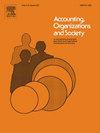对不合作客户经理行为的不一致反应:当审计师的判断和行动出现分歧时
IF 3.6
2区 管理学
Q1 BUSINESS, FINANCE
引用次数: 0
摘要
审计师经常遇到不合作的客户,这使得证据收集变得更加困难,但先前的研究指出了审计师对这种行为的反应的相互矛盾的观点。为了更加清晰,我们进行了四项研究。在研究1中,我们预测并发现,员工审计人员在面对不合作客户时,会增加怀疑判断,但也会减少怀疑行为,从而产生与审计风险模型相矛盾的不一致。我们还发现,这种不一致是由参与者担心对不合作的客户采取行动会引起焦虑所驱动的。在研究2中,我们重复了这些结果,但也发现当行动需要与不合作的客户进行较少的人际接触时,不一致性就会减少。第三个实验(研究3)和附带的调查(研究4)表明,客户人员,特别是那些经验更丰富的人员,预期员工审计师对不太合作的行为的反应,并在误报或试图逃避审计师审查时利用这些反应。总之,本文发展了关于审计师对不合作客户的不一致反应的理论,具有方法论意义,并且与关注审计师判断和行动之间不一致的从业者相关。本文章由计算机程序翻译,如有差异,请以英文原文为准。
Inconsistent responses to uncooperative client manager behavior: When auditors’ judgments and actions diverge
Auditors frequently encounter uncooperative clients that make evidence collection more difficult, but prior research points to conflicting perspectives on auditor reactions to this behavior. To add clarity, we conduct four studies. In Study 1, we predict and find that staff auditors increase their skeptical judgments in response to uncooperative clients, but also decrease their skeptical actions, creating an inconsistency that contradicts the audit risk model. We also find that the inconsistency is driven by participant concerns that taking actions against uncooperative clients will induce anxiety. In Study 2, we replicate these results, but also find that the inconsistency is reduced when actions require less interpersonal contact with the uncooperative client. A third experiment (Study 3) and an accompanying survey (Study 4) indicate that client personnel, especially those with more experience, anticipate staff auditor responses to less cooperative behavior and exploit these responses when misreporting or attempting to avoid auditor scrutiny. Altogether, this paper develops theory about inconsistent auditor reactions to uncooperative clients, has methodological implications, and is relevant to practitioners concerned about inconsistency between auditor judgment and action.
求助全文
通过发布文献求助,成功后即可免费获取论文全文。
去求助
来源期刊

Accounting Organizations and Society
BUSINESS, FINANCE-
CiteScore
7.80
自引率
6.40%
发文量
38
期刊介绍:
Accounting, Organizations & Society is a major international journal concerned with all aspects of the relationship between accounting and human behaviour, organizational structures and processes, and the changing social and political environment of the enterprise.
 求助内容:
求助内容: 应助结果提醒方式:
应助结果提醒方式:


